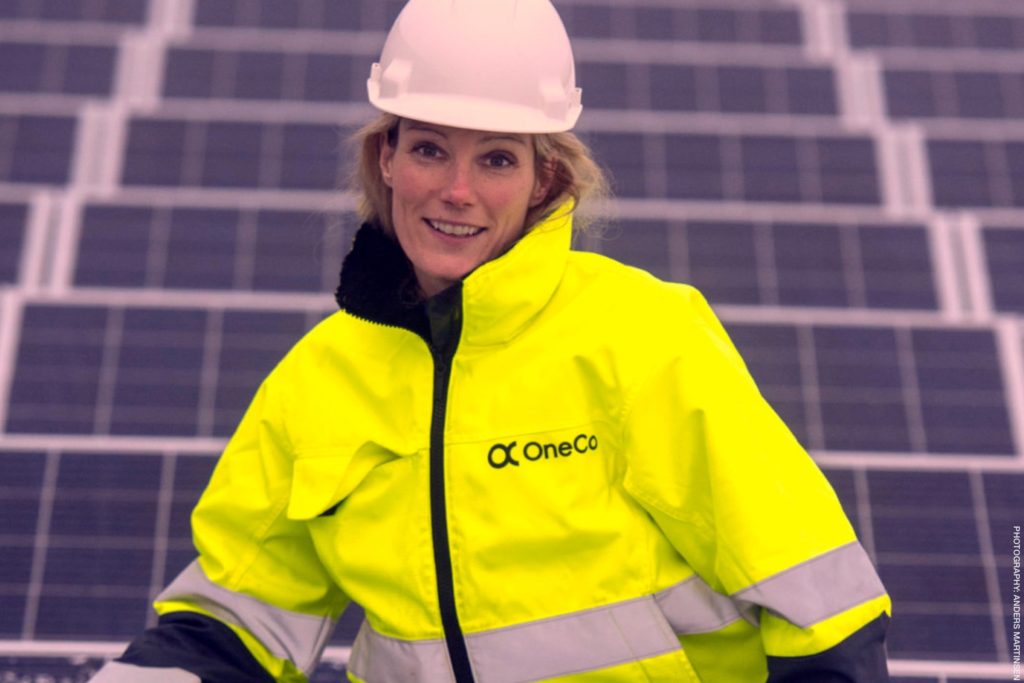
“For safety reasons this work needs to be carried out by competent electro personnel,” says Ms Ellen Kathrine Lie, head of OneCo’s solar efforts.”
In order to reach the climate goals the transition to renewable energy intensifies while the use is dramatically streamlined. Norwegian OneCo and German WaveTech have come up with a number of good solutions.
We call ourselves electricians of the future, focusing on the environment and sustainability, delivering systems for sun, hydrogen and wind, combined with batteries. Norway is currently electrifying at high speed, especially in terms of solar energy, a field in which traditional electricians have little experience. For safety reasons this work needs to be carried out by competent electro personnel, says Ms Ellen Kathrine Lie, head of OneCo’s solar efforts.
“We try to share knowledge about the alternatives, with honest information on how solar power stations may be put to use. The thing is they shouldn’t be oversized, which is why we try to match the systems’ output with the actual energy requirements on an hourly basis, ensuring that dimensions are correct. In addition we present our suppliers with a set of demands, answered with an EPD (Environmental Product Declaration), which, simply put, documents the CO2 footprint.”
Buy at low rates, use at high
“We decided to work with WaveTech and their wide array of interesting technology. There’s a lot of lead-acid batteries on the market, and WaveTech solutions double the remaining lifetime of existing lead-acid batteries, which ties in very nicely with our sustainability ambitions, not to mention the prospective outlook on recovery of spent batteries,” she continues.
“You don’t see possibilities like that elsewhere and WaveTech is working relentlessly with innovation, so when they first made contact we were immediately interested, due to the possibilities with respect to both green and financial gains. One would think that batteries are used for storage of solar energy, but we’re talking buffering energy purchases at a low rate, to spend when prices are high, and the more sustainable we build, the more unstable the power grid gets, which is where lithium-based batteries will be a driving force, although we’re looking at a combination of solutions.”
“Businesses have their tariffs, yielding prices that increase as the consumption grows, which is an arrangement implemented for private households next year, making batteries a likely household option, too, and we’re prepared,” Lie explains.
WaveTech provides solutions to OneCo, primarily in the telecom segment. The company’s COO Mr Aasmund Erlandsen explains that the mobile telephone net depends on electricity, and a backup, in case of power-outage.
Triple energy output
“Which makes it all the more important that batteries actually work, which is where we enter the scene, with a system doubling their lifetime, as well as tripling the energy output,” he says.
“We will be able to charge batteries faster, and assisted by pulses we dissolve the crystals responsible for the battery ageing, whereby ions are brought to react more effectively and swiftly between poles and battery fluids. The solutions provide a sharp reduction in CO2 emissions, battery replacements, fuel costs, maintenance and energy consumption, as well as a much more predictable maintenance.”
“Users may monitor battery status and the entire cell tower status. Should a remote tower experience a power outage, OneCo would have to send a team, but this is where that cost could be avoided. In addition the system could operate at much higher temperatures, removing the need for power consuming air conditioning, so savings are considerable, but it doesn’t stop there.”
“Our R&D department is set to release a solution for recovery of dead batteries otherwise sent to recirculation, so the potential is practically unlimited, and we’re happy to have OneCo with us,” Erlandsen concludes.
One would think that batteries are used for storage of solar energy, but we’re talking buffering energy purchases at a low rate, to spend when prices are high


